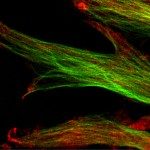Lien vers Pubmed [PMID] – 22821535
Methods Mol. Biol. 2012;896:331-49
Under physiological conditions, intrinsically disordered proteins (IDPs) are unfolded, mainly because of their low hydrophobicity and the strong electrostatic repulsion between charged residues of the same sign within the protein. Softwares have been designed to facilitate the computation of the mean net charge of proteins (formally protein valence) from their amino acid sequences. Nevertheless, discrepancies between experimental and computed valence values for several proteins have been reported in the literature. Hence, experimental approaches are required to obtain accurate estimation of protein valence in solution. Moreover, ligand-induced disorder-to-order transition is involved in the folding of numerous IDPs. Some of the ligands are cations or anions, which, upon protein binding, decrease the mean net charge of the protein, favoring its folding via a charge reduction effect. An accurate determination of the mean net charge of protein in both its ligand-free intrinsically disordered state and in its folded, ligand-bound state allows one to estimate the number of ligands bound to the protein in the holo-state. Here, we describe an experimental protocol to determine the mean net charge of protein, from its electrophoretic mobility, its molecular mass and its hydrodynamic radius.
